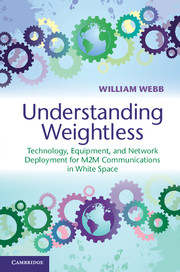 Understanding Weightless
Understanding Weightless Published online by Cambridge University Press: 05 April 2012
What defines a machine?
Wireless communications are widespread, but tend to be used predominantly by people. Mobile phones allow people to talk or send emails, Wi-Fi systems allow people to surf the Internet from a laptop and Bluetooth links allow people to use cordless headsets. There is an entirely different class of applications for devices that do not directly have users and whose communications are not instigated by people. A good example of this is a smart electricity meter. It might send meter readings to a database every hour. It has no direct linkage with any person – although indirectly it makes their life somewhat better by enabling smart grids and automating the meter-reading process.
There are so many different applications and machines that a clear definition of one is not possible. Broadly, these are devices where transmissions occur due to the function of the machine rather than any person. They send information not to another person but typically to a database within the network from where it can be processed by other machines. Of course, sooner or later someone benefits from the service provided, but typically not from the radio transmission itself. Applications include automotive engine management updates, healthcare monitoring, smart city sensors and actuators, smart grids, asset tracking, industrial automation, traffic control and much more.
To save this book to your Kindle, first ensure [email protected] is added to your Approved Personal Document E-mail List under your Personal Document Settings on the Manage Your Content and Devices page of your Amazon account. Then enter the ‘name’ part of your Kindle email address below. Find out more about saving to your Kindle.
Note you can select to save to either the @free.kindle.com or @kindle.com variations. ‘@free.kindle.com’ emails are free but can only be saved to your device when it is connected to wi-fi. ‘@kindle.com’ emails can be delivered even when you are not connected to wi-fi, but note that service fees apply.
Find out more about the Kindle Personal Document Service.
To save content items to your account, please confirm that you agree to abide by our usage policies. If this is the first time you use this feature, you will be asked to authorise Cambridge Core to connect with your account. Find out more about saving content to Dropbox.
To save content items to your account, please confirm that you agree to abide by our usage policies. If this is the first time you use this feature, you will be asked to authorise Cambridge Core to connect with your account. Find out more about saving content to Google Drive.